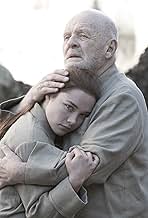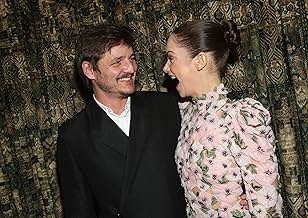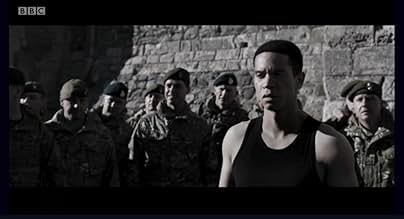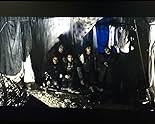AVALIAÇÃO DA IMDb
6,2/10
4,6 mil
SUA AVALIAÇÃO
Adicionar um enredo no seu idiomaAn aging King invites disaster when he abdicates to his corrupt, toadying daughters, and rejects his loving and honest one.An aging King invites disaster when he abdicates to his corrupt, toadying daughters, and rejects his loving and honest one.An aging King invites disaster when he abdicates to his corrupt, toadying daughters, and rejects his loving and honest one.
- Direção
- Roteiristas
- Artistas
- Indicado para 1 Primetime Emmy
- 1 vitória e 17 indicações no total
- Direção
- Roteiristas
- Elenco e equipe completos
- Produção, bilheteria e muito mais no IMDbPro
Resumo
Reviewers say 'King Lear' (2018) is lauded for its exceptional cast, especially Anthony Hopkins, Emma Thompson, and Emily Watson, and its modern setting that revitalizes Shakespeare's text. However, Hopkins's performance is criticized as one-note, and the film's heavy abridgement is faulted for losing crucial scenes and character depth. The modern setting is seen as both innovative and gimmicky, impacting the original context. Despite these issues, the adaptation is considered visually striking and emotionally resonant.
Avaliações em destaque
Lear, an elderly king, has decided to divide his kingdom between his three daughters but first he asks each how much they love him to decide who should get the largest share. The elder two, Goneril and Regan, profess their love in false, obsequious tones but Cordelia, the youngest and most beloved, says she has no words to say how much she loves him... and is immediately disowned. The Earl of Kent speaks up for her but he too is banished. Tensions soon rise as various parties try to position themselves for power and the king's grip on reality slips further; tragedy is inevitable.
One wouldn't really say this BBC production was enjoyably... 'King Lear' is one of Shakespeare's more tragic plays; it is however a gripping production. Anthony Hopkins does a fine job as Lear, really capturing the anger and confusion of the character as he slips into senility. Emma Thompson, Emily Watson and Florence Pugh impress as Goneril, Regan and Cordelia although we see far more of the former two and they get more to work with. The rest of the cast is solid and includes plenty of familiar faces. There are some disturbing moments... the sight of a character having his eyes gouged out certainly had me wincing. Director Richard Eyre did a fine job capturing the bleakness of the story; the colour draining from the picture as the story progresses to such an extent that the final scenes was almost black and white. Overall I'd certainly recommend this to fans of Shakespeare on film.
One wouldn't really say this BBC production was enjoyably... 'King Lear' is one of Shakespeare's more tragic plays; it is however a gripping production. Anthony Hopkins does a fine job as Lear, really capturing the anger and confusion of the character as he slips into senility. Emma Thompson, Emily Watson and Florence Pugh impress as Goneril, Regan and Cordelia although we see far more of the former two and they get more to work with. The rest of the cast is solid and includes plenty of familiar faces. There are some disturbing moments... the sight of a character having his eyes gouged out certainly had me wincing. Director Richard Eyre did a fine job capturing the bleakness of the story; the colour draining from the picture as the story progresses to such an extent that the final scenes was almost black and white. Overall I'd certainly recommend this to fans of Shakespeare on film.
My word not many laughs in King Lear. My son who fancied a bit of Shakespeare got put off by the eye gouging scene of Gloucester. He went off to watch a James Bond movie, Spectre I think!
Richard Eyre who worked with Anthony Hopkins in the film version of The Dresser, reunited with him again as Eyre adapts and directs the film version of King Lear.
The setting is modern day Britain as a military dictatorship.
The ageing Lear has gathered his family to divide up his kingdom in what proves to be unwise. One part to his daughter Goneril (Emma Thompson), the other to Regan (Emily Watson) and the remainder would had gone to Cordelia (Florence Pugh) until she fails to show her father enough devotion and flattery. She is disinherited and banished.
The declaration of love and devotion from Goneril and Regan are false. The autocrat is usurped from his power by two of his offspring with Cordelia who was the only daughter true to him. Lear descends into madness.
Eyre has wisely cut the text down so the running length is less than two hours but I still found the play dense and also at times choppy. I liked some of the updates. Edgar and Edmund's battle is a mixed martial arts contest. Lear walks around the shopping precinct, homeless and pathetically pushing a shopping trolley with rubbish.
Hopkins, maybe due to his Celtic temperament delivers a shouty performance. A man in rage and also pathetic as he is played like a puppet on a string by Goneril and Regan.
This Lear is wonderfully filmed, the picture gets desaturated as the story gets bleaker by the end.
Richard Eyre who worked with Anthony Hopkins in the film version of The Dresser, reunited with him again as Eyre adapts and directs the film version of King Lear.
The setting is modern day Britain as a military dictatorship.
The ageing Lear has gathered his family to divide up his kingdom in what proves to be unwise. One part to his daughter Goneril (Emma Thompson), the other to Regan (Emily Watson) and the remainder would had gone to Cordelia (Florence Pugh) until she fails to show her father enough devotion and flattery. She is disinherited and banished.
The declaration of love and devotion from Goneril and Regan are false. The autocrat is usurped from his power by two of his offspring with Cordelia who was the only daughter true to him. Lear descends into madness.
Eyre has wisely cut the text down so the running length is less than two hours but I still found the play dense and also at times choppy. I liked some of the updates. Edgar and Edmund's battle is a mixed martial arts contest. Lear walks around the shopping precinct, homeless and pathetically pushing a shopping trolley with rubbish.
Hopkins, maybe due to his Celtic temperament delivers a shouty performance. A man in rage and also pathetic as he is played like a puppet on a string by Goneril and Regan.
This Lear is wonderfully filmed, the picture gets desaturated as the story gets bleaker by the end.
I only wish more of Shakespeare's work would be interpreted in this creative way .. the production partnership in here by BBC and Amazon and directing by the talented "king Lear" expert Richard Eyre did one spectacular job .. yet .. i still have no idea who came up by this "modernizing" of the Shakespearean work like this .. it shins with originality and thrill.
The madness, tension and stress presented by Anthony Hopkins is indescribable ,, felt like he's on the stage of a theater of his imagination he owned each and every line ... i mean even though i needed English subtitles for the movie just to keep up .. still he was amazing .. the whole cast were .. and what a cast ... The kingdom's finest ... Emma Thompson, Jim Carter, Tobias Menzies and Andrew Scott (Moriarty from Sherlock :D) ..just wow.
The movie might be a hard work ,, but it's worth it if you love classical tragedies of Shakespeare and you're prepared to see it in a new style.
The madness, tension and stress presented by Anthony Hopkins is indescribable ,, felt like he's on the stage of a theater of his imagination he owned each and every line ... i mean even though i needed English subtitles for the movie just to keep up .. still he was amazing .. the whole cast were .. and what a cast ... The kingdom's finest ... Emma Thompson, Jim Carter, Tobias Menzies and Andrew Scott (Moriarty from Sherlock :D) ..just wow.
The movie might be a hard work ,, but it's worth it if you love classical tragedies of Shakespeare and you're prepared to see it in a new style.
The thing about seeing a performance of a part in a play or literary adaptation (or really any acting role) that one comes to regard as "definitive", is that such a performance will have a detrimental effect on one's ability to objectively judge any subsequent performance of that part, as any such performance will necessarily be found wanting. Antony Sher as Richard III in Bill Alexander's 1984 RSC production, Kenneth Branagh as Henry V in his own 1989 film adaptation (Henrique V (1989)), Harris Yulin as Willy Loman in David Esbjornson's 2010 Gate Theatre production of Death of a Salesman, Gillian Anderson as Blanche duBois in Benedict Andrews's 2014 Young Vic production of A Streetcar Named Desire, even something like Christopher Lee as Dracula or Marlon Brando as Kurtz in Apocalypse Now (1979). All definitive.
For me, the definitive Lear is a no brainer - Owen Roe in Selina Cartmell's magisterial 2013 Abbey Theatre production. Roe was very much helped by the extraordinarily ambitious direction of Cartmell. However, irrespective of directorial assistance, the scenes on the heath (the so-called "unactable" portion of King Lear), were unlike anything I've ever seen, as Roe alternates, sentence by sentence (!) between a fairly standard (if brilliantly staged) raging at the heavens, and turning directly to the audience and speaking quietly and calmly, almost emotionlessly. Sentence. By. Sentence. Without breaking the metre of the iambic pentameter verse!! Of course, Cartmell's choice here is obvious; the use of two different styles of delivery serve as a succinct visual/aural metaphor for the inner turmoil of the character, but although it's a thematically simple enough device, it requires a performance of immense control to bring it off.
And then we have Anthony Hopkins in writer/director Richard Eyre's TV adaptation for the BBC. Oh dear.
His performance was never going to touch Roe's masterclass for me, but what's especially disappointing is how little interested he seems in doing anything beyond giving the barest essentials in his interpretation of the part.
Having said that, that Hopkins would appear in any filmic adaptation of Lear at all is unexpected. He has played the part before - over one-hundred performances in David Hare's 1986 National Theatre production; a run which was almost immediately followed by over one-hundred performances in Peter Hall's 1987 production of Antony and Cleopatra. Hopkins had been growing disillusioned with theatre acting for some time, and his success in films such as O Homem Elefante (1980) and Rebelião em Alto Mar (1984) served only to expedite his growing dissatisfaction. Disliking the experience of performing Shakespeare over two-hundred times in the course of two years, and feeling burnt out (who can blame him), after Antony finished its run, Hopkins moved to the US to pursue film acting full time. He has often spoken since about just how much he hated those two years, and how much he grew to loathe Shakespeare, particularly Lear. On his commentary track for Julie Taymor's Titus (1999), he points out that as far as he was concerned, he was done with Shakespeare, until Taymor convinced him to appear in the film adaptation of her own 1994 Theatre for a New Audience production. He also stresses that Titus will most likely be the last time in his life he plays Shakespeare (calling the performance his "swan song"). Obviously, he changed his mind (or Eyre changed it for him), but that he would do so with Lear, of all plays, is decidedly unexpected.
So, with that in mind, what exactly is wrong with his performance? How can someone who played the part over one-hundred times possibly give an under par performance? Well, probably because he played the role over one-hundred times. The performance is lethargic, jaded, lazy, as if it's routine, become so familiar that all meaning has evaporated from the text (similar to when you say a word over and over and it starts to sound strange). Hopkins plays Lear as an easy-to-anger man, used to getting his own way, with little time for sentiment, whose grip on reality is becoming increasingly tenuous. Nothing wrong with that - it's a very basic reading of the character, but still nothing inherently wrong with it. The problem is, we've seen Hopkins play this character before, or a variation thereof, in everything from Lendas da Paixão (1994) to Nixon (1995) to O Lobisomem (2010). Indeed, his performances in Eyre's Lear is, beat for beat, a virtual carbon copy of his performance in Taymor's Titus. There are many similarities between the characters, to be sure, but not so many that the parts should be played in exactly the same way (as a contrast, look at Brian Cox's performance in the two roles; Titus in Deborah Warner's ground-breaking 1987 RSC production, and Lear in Warner's 1990 National Theatre production - three years, and an ocean of interpretive difference separate the performances).
Hopkins's performance has two gears - scenery chewing and shouty scenery chewing. That's it. Compare the lack of pathos, emotion, or nuance in his performance to, for example, Cox, Paul Scofield (in Peter Brook's 1971 film - Rei Lear (1970)), Jüri Järvet (in Grigoriy Kozintsev's 1971 film - Rei Lear da Inglaterra (1970)), Laurence Olivier (in Michael Elliott's 1983 TV movie for ITV - Rei Lear (1983)), or Anthony Sher (in Gregory Doran's 2018 RSC production). All of them show more range, and a wider and more complete understanding of the text than Hopkins's one note performance. Also, his tendency to pause in the middle of verse lines is extremely distracting, and completely disrupts the meter. Such pauses serve to create artificial caesuras in the iambic pentameter lines, turning the verse into a bizarre amalgamation of anapaestic and dactylic hexameters, and even heptameters. A stronger director would have stamped this out, or had the actor speak in prose (as a few of the other actors do), but to have the actor speak in verse, but show no respect for the verse is...strange.
Thankfully the rest of the cast are universally strong. And what a cast! Emma Thompson as an especially nasty Goneril; Jim Broadbent as a deeply sympathetic Gloucester; John Macmillan as a soft-spoken Edmund; Andrew Scott as a highly emotional Edgar; Jim Carter as a gruff Kent; soon-to-be-superstar Florence Pugh as a very young and wide-eyed Cordelia; Karl Johnson as a decidedly serious Fool; Christopher Eccleston as a suitably ridiculous Oswald; Anthony Calf as a take-charge Albany; and Chukwudi Iwuji as a considerate France. However, the film is stolen by the work of Emily Watson and Tobias Menzies as an insanely bloodthirsty Regan and Cornwall. Watson's Regan oozes raw sexuality, and the (very graphic) blinding scene clearly turns both of them on. Two terrific performances which left me wishing there was more of them together in the play.
Also impressive is Eyre's direction, although the lack of editing rhythm in the opening scene is a little strange, and the shot composition in places tends to flatten the image, making it seem a little like a filmed play. His decision to set the play in modern London, however, with Lear as a retiring pseudo-dictator, works very well (Edgar is an astrophysicist, Edmund is in the armed forces). In this context, the shopping mall scene is especially well conceived and executed, as a now quite mad Lear wanders around a near-derelict shopping mall in a bad part of town, dressed like a vagrant, pushing a shopping trolley, and talking to a doll. It's a deeply unsettling image that encapsulates perfectly just how far he has fallen. Also well conceived is the scene set in an asylum seekers' refugee camp. The political commentary is a little on the nose, as Lear looks around the camp at the faces of the refugees, forcing him to consider issues of which he's never before conceived, but it's effective, timely and non-intrusive.
So, all-in-all, a strong adaptation with an excellent cast brought down only by a weak central performance. Unfortunately, the part of Lear is so completely central, pivotal, and dominating, that if it doesn't work, there's a problem. Hopkins's performance isn't so bad as to distract too much from the excellent work done elsewhere in the piece, but what's annoying about it is it could easily have been so much better. Mind you, members of the cast have been active on Twitter and the interview circuit for the last couple of weeks talking about how much they loved working with Hopkins, and how tremendous they think he is in the role (oftentimes, going to the set even when they weren't working, just to watch him filming). So, what do I know?
For me, the definitive Lear is a no brainer - Owen Roe in Selina Cartmell's magisterial 2013 Abbey Theatre production. Roe was very much helped by the extraordinarily ambitious direction of Cartmell. However, irrespective of directorial assistance, the scenes on the heath (the so-called "unactable" portion of King Lear), were unlike anything I've ever seen, as Roe alternates, sentence by sentence (!) between a fairly standard (if brilliantly staged) raging at the heavens, and turning directly to the audience and speaking quietly and calmly, almost emotionlessly. Sentence. By. Sentence. Without breaking the metre of the iambic pentameter verse!! Of course, Cartmell's choice here is obvious; the use of two different styles of delivery serve as a succinct visual/aural metaphor for the inner turmoil of the character, but although it's a thematically simple enough device, it requires a performance of immense control to bring it off.
And then we have Anthony Hopkins in writer/director Richard Eyre's TV adaptation for the BBC. Oh dear.
His performance was never going to touch Roe's masterclass for me, but what's especially disappointing is how little interested he seems in doing anything beyond giving the barest essentials in his interpretation of the part.
Having said that, that Hopkins would appear in any filmic adaptation of Lear at all is unexpected. He has played the part before - over one-hundred performances in David Hare's 1986 National Theatre production; a run which was almost immediately followed by over one-hundred performances in Peter Hall's 1987 production of Antony and Cleopatra. Hopkins had been growing disillusioned with theatre acting for some time, and his success in films such as O Homem Elefante (1980) and Rebelião em Alto Mar (1984) served only to expedite his growing dissatisfaction. Disliking the experience of performing Shakespeare over two-hundred times in the course of two years, and feeling burnt out (who can blame him), after Antony finished its run, Hopkins moved to the US to pursue film acting full time. He has often spoken since about just how much he hated those two years, and how much he grew to loathe Shakespeare, particularly Lear. On his commentary track for Julie Taymor's Titus (1999), he points out that as far as he was concerned, he was done with Shakespeare, until Taymor convinced him to appear in the film adaptation of her own 1994 Theatre for a New Audience production. He also stresses that Titus will most likely be the last time in his life he plays Shakespeare (calling the performance his "swan song"). Obviously, he changed his mind (or Eyre changed it for him), but that he would do so with Lear, of all plays, is decidedly unexpected.
So, with that in mind, what exactly is wrong with his performance? How can someone who played the part over one-hundred times possibly give an under par performance? Well, probably because he played the role over one-hundred times. The performance is lethargic, jaded, lazy, as if it's routine, become so familiar that all meaning has evaporated from the text (similar to when you say a word over and over and it starts to sound strange). Hopkins plays Lear as an easy-to-anger man, used to getting his own way, with little time for sentiment, whose grip on reality is becoming increasingly tenuous. Nothing wrong with that - it's a very basic reading of the character, but still nothing inherently wrong with it. The problem is, we've seen Hopkins play this character before, or a variation thereof, in everything from Lendas da Paixão (1994) to Nixon (1995) to O Lobisomem (2010). Indeed, his performances in Eyre's Lear is, beat for beat, a virtual carbon copy of his performance in Taymor's Titus. There are many similarities between the characters, to be sure, but not so many that the parts should be played in exactly the same way (as a contrast, look at Brian Cox's performance in the two roles; Titus in Deborah Warner's ground-breaking 1987 RSC production, and Lear in Warner's 1990 National Theatre production - three years, and an ocean of interpretive difference separate the performances).
Hopkins's performance has two gears - scenery chewing and shouty scenery chewing. That's it. Compare the lack of pathos, emotion, or nuance in his performance to, for example, Cox, Paul Scofield (in Peter Brook's 1971 film - Rei Lear (1970)), Jüri Järvet (in Grigoriy Kozintsev's 1971 film - Rei Lear da Inglaterra (1970)), Laurence Olivier (in Michael Elliott's 1983 TV movie for ITV - Rei Lear (1983)), or Anthony Sher (in Gregory Doran's 2018 RSC production). All of them show more range, and a wider and more complete understanding of the text than Hopkins's one note performance. Also, his tendency to pause in the middle of verse lines is extremely distracting, and completely disrupts the meter. Such pauses serve to create artificial caesuras in the iambic pentameter lines, turning the verse into a bizarre amalgamation of anapaestic and dactylic hexameters, and even heptameters. A stronger director would have stamped this out, or had the actor speak in prose (as a few of the other actors do), but to have the actor speak in verse, but show no respect for the verse is...strange.
Thankfully the rest of the cast are universally strong. And what a cast! Emma Thompson as an especially nasty Goneril; Jim Broadbent as a deeply sympathetic Gloucester; John Macmillan as a soft-spoken Edmund; Andrew Scott as a highly emotional Edgar; Jim Carter as a gruff Kent; soon-to-be-superstar Florence Pugh as a very young and wide-eyed Cordelia; Karl Johnson as a decidedly serious Fool; Christopher Eccleston as a suitably ridiculous Oswald; Anthony Calf as a take-charge Albany; and Chukwudi Iwuji as a considerate France. However, the film is stolen by the work of Emily Watson and Tobias Menzies as an insanely bloodthirsty Regan and Cornwall. Watson's Regan oozes raw sexuality, and the (very graphic) blinding scene clearly turns both of them on. Two terrific performances which left me wishing there was more of them together in the play.
Also impressive is Eyre's direction, although the lack of editing rhythm in the opening scene is a little strange, and the shot composition in places tends to flatten the image, making it seem a little like a filmed play. His decision to set the play in modern London, however, with Lear as a retiring pseudo-dictator, works very well (Edgar is an astrophysicist, Edmund is in the armed forces). In this context, the shopping mall scene is especially well conceived and executed, as a now quite mad Lear wanders around a near-derelict shopping mall in a bad part of town, dressed like a vagrant, pushing a shopping trolley, and talking to a doll. It's a deeply unsettling image that encapsulates perfectly just how far he has fallen. Also well conceived is the scene set in an asylum seekers' refugee camp. The political commentary is a little on the nose, as Lear looks around the camp at the faces of the refugees, forcing him to consider issues of which he's never before conceived, but it's effective, timely and non-intrusive.
So, all-in-all, a strong adaptation with an excellent cast brought down only by a weak central performance. Unfortunately, the part of Lear is so completely central, pivotal, and dominating, that if it doesn't work, there's a problem. Hopkins's performance isn't so bad as to distract too much from the excellent work done elsewhere in the piece, but what's annoying about it is it could easily have been so much better. Mind you, members of the cast have been active on Twitter and the interview circuit for the last couple of weeks talking about how much they loved working with Hopkins, and how tremendous they think he is in the role (oftentimes, going to the set even when they weren't working, just to watch him filming). So, what do I know?
This is a gripping rendition of Lear with fantastic performances by all. Nearly all the famous and inspiring lines are here. I say "nearly".
There were several cuts to Shakespeare's text that surprised and disappointed me. A couple examples: 1) When Kent (Jim Carter) berates Oswald (Christopher Eccleston) I couldn't wait for Kent's long insulting harangue of Oswald: "A knave, a rascal, an eater of broken meats, etc." Alas, it was cut. 2) The most shocking scene in the play, the blinding of Gloucester (Jim Broadbent) by Cornwall (Tobias Menzies), contains the line: "Out, vile jelly! Where is your luster now?" Sadly, the second sentence was cut. I saw a performance where Cornwall not only gouges out Gloucester's eye, but when it pops onto the floor, he stomps on it. That still gives me chills, but it is not in this version.
Many other of the famous lines are kept in: "How sharper than a serpent's tooth it is to have a thankless child", "Every inch a king", And my favorite speech, Edmund's (John MacMillan) "This is the excellent foppery of the world..."
The cuts from scene to scene were a little jarring, and if one is unfamiliar with the text it is difficult to understand the conversations. The gist of the story can be discerned, but at the end I felt slightly disappointed despite the bravura performances. Emma Thompson as Goneril was cold blooded malice; Emily Watson as Regan was a convincing conniver. Andrew Scott was fine as Edgar but the film does not explain how no one could recognize him despite having nothing more than a dirty face and a woman's frock on. The same goes for Jim Carter's Kent, although he did at least shave off his hair and moustache, and wore shabby clothes.
Anthony Hopkins was excellent as Lear, with the full range of emotions Shakespeare gives him: loving, raging, angry, mad and grief stricken.
There were several cuts to Shakespeare's text that surprised and disappointed me. A couple examples: 1) When Kent (Jim Carter) berates Oswald (Christopher Eccleston) I couldn't wait for Kent's long insulting harangue of Oswald: "A knave, a rascal, an eater of broken meats, etc." Alas, it was cut. 2) The most shocking scene in the play, the blinding of Gloucester (Jim Broadbent) by Cornwall (Tobias Menzies), contains the line: "Out, vile jelly! Where is your luster now?" Sadly, the second sentence was cut. I saw a performance where Cornwall not only gouges out Gloucester's eye, but when it pops onto the floor, he stomps on it. That still gives me chills, but it is not in this version.
Many other of the famous lines are kept in: "How sharper than a serpent's tooth it is to have a thankless child", "Every inch a king", And my favorite speech, Edmund's (John MacMillan) "This is the excellent foppery of the world..."
The cuts from scene to scene were a little jarring, and if one is unfamiliar with the text it is difficult to understand the conversations. The gist of the story can be discerned, but at the end I felt slightly disappointed despite the bravura performances. Emma Thompson as Goneril was cold blooded malice; Emily Watson as Regan was a convincing conniver. Andrew Scott was fine as Edgar but the film does not explain how no one could recognize him despite having nothing more than a dirty face and a woman's frock on. The same goes for Jim Carter's Kent, although he did at least shave off his hair and moustache, and wore shabby clothes.
Anthony Hopkins was excellent as Lear, with the full range of emotions Shakespeare gives him: loving, raging, angry, mad and grief stricken.
Você sabia?
- CuriosidadesAt one point, Sir Anthony Hopkins tried to adapt the play into a movie and intended to star as King Lear. Naomi Watts was cast as Goneril, Gwyneth Paltrow as Regan, and Keira Knightley as Cordelia, but the project never got off the ground and was eventually cancelled.
- ConexõesFeatured in The 71st Primetime Emmy Awards (2019)
Principais escolhas
Faça login para avaliar e ver a lista de recomendações personalizadas
Detalhes
- Data de lançamento
- Países de origem
- Central de atendimento oficial
- Idiomas
- Também conhecido como
- William Shakespeare's King Lear
- Locações de filme
- Empresas de produção
- Consulte mais créditos da empresa na IMDbPro
Contribua para esta página
Sugerir uma alteração ou adicionar conteúdo ausente







































